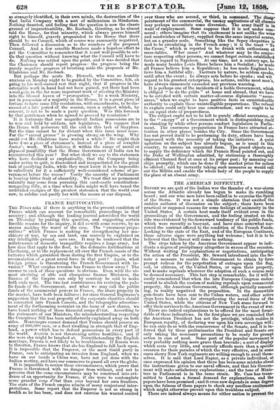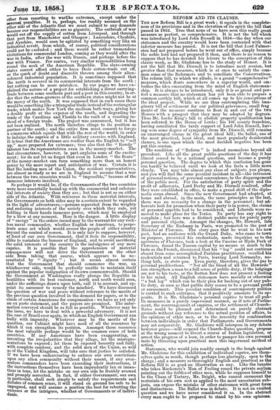THE AMERICAN DIFFICULTY.
BEFORE we are quit of the Indian war the thunder of a war-storm across the Atlantic already has begun to make its rumbling heard ; and our wise men have been called in to exorcise the Spirit of the Storm. It was not a simple alarmism that excited the sudden outburst of discussion on the subject; there have been practical or supposed reasons for some feelings of animosity in the United States. A certain heat made itself evident even in the proceedings of the Government, and the feeling created on this side was evidenced by the downward tendency of thO public funds, which were recently so buoyant, and have since somewhat nar- rowed the contrast offered to the condition of the French Funds. Looking to the state of the East, and of the European Continent, these adverse signs were anything but welcome; but it is to be believed that the threat will come to nothing. The steps taken by the American Government appear to indi- dicate a degree of precipitancy altogether in excess of the occasion. Without waiting for explanations or negotiations, anticipating the action of the President, Mr. Seward introduced into the Se- nate a measure to enable the Government to obtain by force prompt redress for the perpetration of outrages upon the flag, soil, or citizens, of the United States, or upon their property, and to make reprisals wherever the adoption of such a course may be deemed necessary. This last step is remarkable, for it will be easily remembered that when the late European Congress endea- voured to abolish the custom of making reprisals upon commercial property, the American Government, although partially consent- ing, in reality negatived the proposition. In the meanwhile gun-boats have been sent to the Cuban waters, and other active steps have been taken for strengthening the naval force of the United States, while the citizens of New York some forward to offer their services to the American Government in the event of war.
There are indeed explanations to be offered for the 'most formi- dable of these indications. In the first place we are reminded that the American President has not the privilege, which resides in European royalty, of declaring war upon his own sovereign will; he can only do so with the concurrence of the Senate, and it is in- ferred that by these preliminaries the President and Senate are only taking the necessary precautions to be ready for prompt action in case of need. Some part of the popular movement is very probably nothing more grave than bravado ; a sort of display which costs very little, and scarcely affords more than a specific occasion for those parades of which the very effective, and in some cases showy New York regiments are willing enough to avail them- selves. It is said that Lord Napier, as a private individual, at once expressed his opinion that there has been some mistake about the instructions given to our naval officers, and that his Govern- ment will make satisfactory explanations ; and the tone of Minis- ters in Parliament is in the same strain. Mr. Cass has trans- mitted to London a formal demand for explanations, and the papers have been promised ; and it even now depends in some degree upon the fulness of these papers to check any needless excitement which might otherwise prevail upon this troublous subject. There are indeed always means for either nation to prevent the other from resorting to warlike extremes, except under the severest penalties. It is, perhaps, too readily assumed on the other side of the Atlantic that we must submit to any demands because our responsibilities are so gigantic. The outbreak of war would cut off the supply of cotton from Liverpool, and through that port from Manchester and Glasgow ; Lancashire, Cheshire, and Ayrshire, would soon be agitated by something very like an industrial revolt, from which, of course, political considerations could not be excluded ; and these would be rather tremendous visitations for commercial London, coming as they would after the war in India, after the war with Russia, and perhaps before the war with France. Per contra,. very similar responsibilities hang round the neck of the American Republic. The slave-owning states cannot afford either to have their cotton-trade cut off, or the spark of doubt and discredit thrown among their alien- coloured Industrial population. It is sometimes supposed that the north is severed in its commercial interests from the south ; but nothing can be more mistaken. In our pages we have ex- plained the nature of a project for establishing a direct carrying- trade between some southern port and a port in this country, in or- der that the cotton-growers of'the southern states might not be at the mercy of the north. It was supposed that in such cases there would be something like a triangular trade instead of the rectangular trade, which makes New York the medium both ways, giving her a double profit at the expense of the south, and degrading the trade of the Carolinas and Florida to the rank of a coasting in- stead of a foreign trade. The project was announced, but it has not been realized. The north therefore clings to its position as partner of the south ; and the entire firm must consent to forego a commerce which equals that with the rest of the world, in order to indulge the caprice of a little military exercise with England. It is true that the Americans are readier than the English to " sell up," more prepared for extremes ; true also that the " Rowdy " interest has its representatives even in the money-market. The last circumstance, however, in part explains some of the excite- ment; for do not let us forget that even in London " the Bears" of the money-market can turn something more than an honest penny by the mere report and anticipation of war. Certain it is that the leading men of the Union, the resident representatives, are almost as ready as we are in England to assume that a war between the two countries would be impossible," because of the immense interests involved.
So perhaps it would be, if the Governments of the two countries were more essentially bound up with the commercial and substan- tial interests of society than they are ; but that is not so on either side of the Atlantic. With reference to these material interests, the Governments on both sides may to a certain extent be regarded in the light of adventurers,—persons separated from the weighty and enduring interests of the society over which they rule, yet holding in their hands immense power, which may be employed for a blow at any moment. Here is the danger. A little display of " energy " in the orders issued may be the warrant for any reck- less naval commander, whether English or American, to perpe- trate some act which would arouse the people of either country beyond the control of reason. It is only fair to suppose, however, at least of our own Government, that it feels its responsibility, alike to maintain the honour of England, and to avoid sacrificing the solid interests of the country in the indulgence of any mere caprice. It is possible that the apprehension of material consequences will not deter the Government on the other side from taking that course, which appears to be ne- cessitated by " dignity " ; but it seems almost certain that the Government that should commence the war, on whichsoever side, would be perfectly unable to maintain itself against the popular indignation of its own commonwealth. Should the Government at Washington really plunge the Republic in hostilities with its best customer, north and south would soon, under the sufferings drawn upon both, call it to account, and ap- point its successor to remedy the mischief. We have discussed the question of war and peace without reference to the merits of the previous question involved in the demand for papers, or to the claim of certain Americans for compensation : we have as yet only an ex parte statement, and the papers are promised. The infor- mation conveyed should be as full as possible. Whatever may be the issue, we have to deal with a powerful adversary. It is not the case of Brazil over again, in which an English Government can bully with impunity. Whatever may be the merits of the question, our Cabinet might have need of all the resources by which it can strengthen its position. Amongst those resources the most valuable perhaps would be the common sense of both countries. If any Americans have been exaggerating, or inventing the irregularities that they allege, let the misrepre- sentations be exposed ; let them be exposed honestly and fully, with complete candour, and the solid men of the Union, as well as of the United Kingdom, will take care that justice be satisfied. If we have been endeavouring to enforce our own convictions upon any alien community without their assent, if any over- zealous commanders have been exceeding their instructions, if the instructions themselves have been imprudently lax or incau- tious in tone, let the mistake on our own side be frankly avowed and promply corrected. In fact, if either Government, our own in particular, shall seek simply to satisfy the requirements and dictates of common sense, it will stand on ground too safe to be impugned, and will assume a position the best for rebutting the excesses or the intrigues, whether of Governments or of indivi- duals.



























 Previous page
Previous page